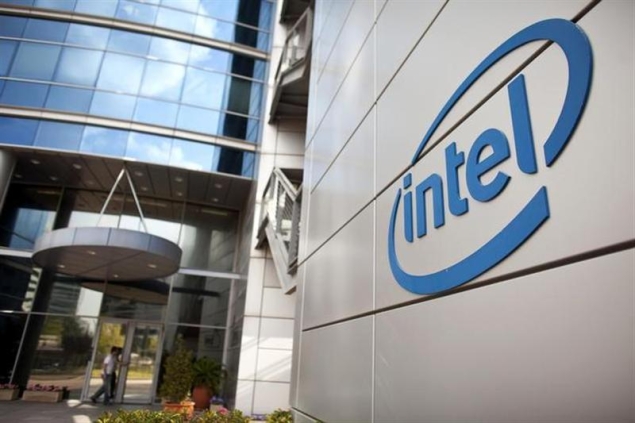- Home
- Tablets
- Tablets News
- Intel to launch new Haswell chip for fan less tablets: Report
Intel to launch new Haswell chip for fan-less tablets: Report
By Anupam Saxena | Updated: 24 July 2013 17:26 IST

Click Here to Add Gadgets360 As A Trusted Source

Advertisement
Intel is expected to announce a new Haswell chip that would be able to fit into thin devices like tablets and not require a fan for cooling.
Intel had showcased a prototype of a fan-less device at Computex 2013 in June, which was powered by a Haswell chip.
According to a report by CNET, the new Haswell chip is expected to be available later this year in limited numbers.
Intel's new fan-less Haswell chip achieves the feat by running at a "scenario design point" (SDP) of 4.5 watts, which is much lower compared to Intel's previous generation Ivy Bridge Processor's thermal range of 10 watts. This means that the new Haswell chip can fit in chasis designed to cool 4.5 watts of heat. The company had said that it was working to lower the Scenario Design Power rating for Haswell to 6 watts, during Computex. This means that it has been able to reduce it much more than that.
While the chip can be clocked to higher speeds depending on the temperature, it can be limited for compact devices like tablets.
This means that device makers will be able to shrink ultraportable laptops, hybrid devices, and tablets further without compromising on power and performance. The move is also inline with Intel's intent to move towards portable devices, tablets and mobile phones in a world where PC sales are decreasing every quarter.
This will also allow tablet makers to deploy Windows 8/ 8.1 in their tablets instead of Windows RT, which failed to take off due to its limited compatibility with applications. Previously, ARM powered Windows tablets could only run Windows RT due to differences in the processor's architecture.
In addition to the fan-less Haswell chips, Intel had also showcased its upgraded Atom chipset for tablets with the Bay Trail-T SoC (system on chip). The new quad-core chip features Intel's 22nm low-power Silvermont microarchitecture for tablets which is similar to the Haswell microarchitecture for computers. The major highlight of the chips is the integrated 4G LTE support. The quad-core Bay Trial SoC is slated to power tablets that will come out in the 2013 holiday season (December).
However, the Haswell chip will deliver more power while optimising power consumption. It's worth pointing out that Haswell processors deliver up to 50 percent increase in battery life over the previous generation, equating to 9 hours of battery life in day-to-day usage for some ultrabooks based on the new processors.
Intel had showcased a prototype of a fan-less device at Computex 2013 in June, which was powered by a Haswell chip.
According to a report by CNET, the new Haswell chip is expected to be available later this year in limited numbers.
Intel's new fan-less Haswell chip achieves the feat by running at a "scenario design point" (SDP) of 4.5 watts, which is much lower compared to Intel's previous generation Ivy Bridge Processor's thermal range of 10 watts. This means that the new Haswell chip can fit in chasis designed to cool 4.5 watts of heat. The company had said that it was working to lower the Scenario Design Power rating for Haswell to 6 watts, during Computex. This means that it has been able to reduce it much more than that.
While the chip can be clocked to higher speeds depending on the temperature, it can be limited for compact devices like tablets.
This means that device makers will be able to shrink ultraportable laptops, hybrid devices, and tablets further without compromising on power and performance. The move is also inline with Intel's intent to move towards portable devices, tablets and mobile phones in a world where PC sales are decreasing every quarter.
This will also allow tablet makers to deploy Windows 8/ 8.1 in their tablets instead of Windows RT, which failed to take off due to its limited compatibility with applications. Previously, ARM powered Windows tablets could only run Windows RT due to differences in the processor's architecture.
In addition to the fan-less Haswell chips, Intel had also showcased its upgraded Atom chipset for tablets with the Bay Trail-T SoC (system on chip). The new quad-core chip features Intel's 22nm low-power Silvermont microarchitecture for tablets which is similar to the Haswell microarchitecture for computers. The major highlight of the chips is the integrated 4G LTE support. The quad-core Bay Trial SoC is slated to power tablets that will come out in the 2013 holiday season (December).
However, the Haswell chip will deliver more power while optimising power consumption. It's worth pointing out that Haswell processors deliver up to 50 percent increase in battery life over the previous generation, equating to 9 hours of battery life in day-to-day usage for some ultrabooks based on the new processors.
Comments
Catch the latest from the Consumer Electronics Show on Gadgets 360, at our CES 2026 hub.
Related Stories
Popular on Gadgets
- Samsung Galaxy Unpacked 2025
- ChatGPT
- Redmi Note 14 Pro+
- iPhone 16
- Apple Vision Pro
- Oneplus 12
- OnePlus Nord CE 3 Lite 5G
- iPhone 13
- Xiaomi 14 Pro
- Oppo Find N3
- Tecno Spark Go (2023)
- Realme V30
- Best Phones Under 25000
- Samsung Galaxy S24 Series
- Cryptocurrency
- iQoo 12
- Samsung Galaxy S24 Ultra
- Giottus
- Samsung Galaxy Z Flip 5
- Apple 'Scary Fast'
- Housefull 5
- GoPro Hero 12 Black Review
- Invincible Season 2
- JioGlass
- HD Ready TV
- Laptop Under 50000
- Smartwatch Under 10000
- Latest Mobile Phones
- Compare Phones
Latest Gadgets
- OPPO Reno 15 Pro Max
- Honor Win RT
- Honor Win
- Xiaomi 17 Ultra Leica Edition
- Xiaomi 17 Ultra
- Huawei Nova 15
- Huawei Nova 15 Pro
- Huawei Nova 15 Ultra
- Asus ProArt P16
- MacBook Pro 14-inch (M5, 2025)
- OPPO Pad Air 5
- Huawei MatePad 11.5 (2026)
- Xiaomi Watch 5
- Huawei Watch 10th Anniversary Edition
- Acerpure Nitro Z Series 100-inch QLED TV
- Samsung 43 Inch LED Ultra HD (4K) Smart TV (UA43UE81AFULXL)
- Asus ROG Ally
- Nintendo Switch Lite
- Haier 1.6 Ton 5 Star Inverter Split AC (HSU19G-MZAID5BN-INV)
- Haier 1.6 Ton 5 Star Inverter Split AC (HSU19G-MZAIM5BN-INV)
© Copyright Red Pixels Ventures Limited 2026. All rights reserved.

















